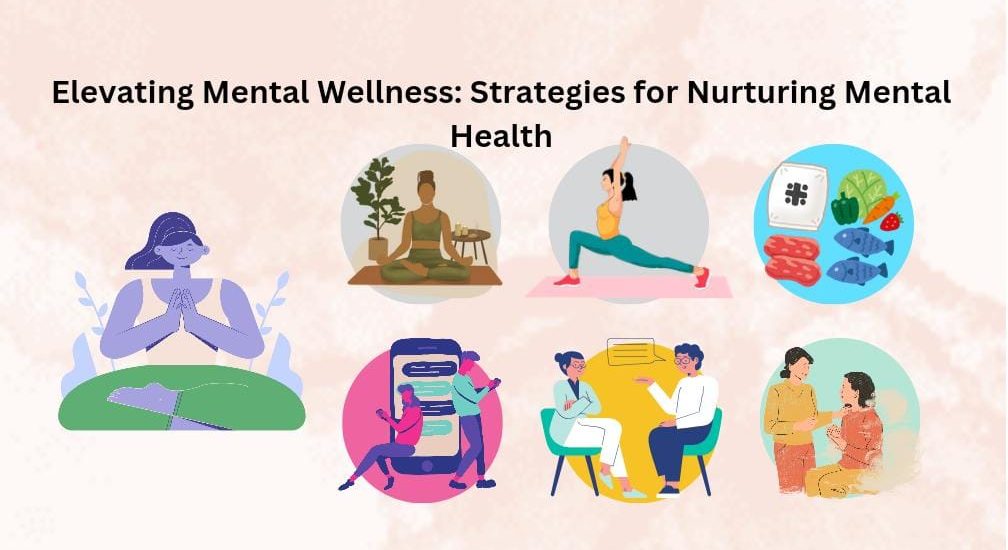In the fast-paced, often stressful landscape of modern life, nurturing mental health is paramount for overall well-being. Just as we prioritize physical health through exercise and nutrition, it’s equally crucial to dedicate time and effort to promote mental wellness.
From conventional practices to innovative therapies, here are several strategies to enhance mental health and foster resilience.
Mindfulness Meditation
Cultivating mindfulness through meditation practices offers profound benefits for mental health. By directing attention to the present moment without judgment, individuals can reduce stress, anxiety, and rumination. Regular meditation sessions have been linked to improved emotional regulation and increased feelings of calmness and clarity.
Physical Exercise
Physical activity isn’t just beneficial for the body; it’s also a powerful tool for supporting mental health. Engaging in regular exercise releases endorphins—neurotransmitters that alleviate stress and elevate mood. Whether it’s a brisk walk, yoga, or weightlifting, finding enjoyable ways to move your body can significantly enhance your overall well-being.
Healthy Nutrition
The correlation between diet and mental health is gaining recognition at a rapid pace. Opting for a balanced diet filled with fruits, vegetables, whole grains, and lean proteins offers vital nutrients that bolster brain function and regulate mood effectively. Steering clear of excessive caffeine, sugar, and processed foods can contribute to stabilizing mood and sustaining consistent energy levels.
Social Connection
As social beings, humans thrive on meaningful connections with others, which play a pivotal role in maintaining mental health. Cultivating relationships with friends, family, and community members not only offers emotional support but also diminishes feelings of loneliness while fostering a profound sense of belonging.
Actively participating in social activities, whether face-to-face or virtually, strengthens interpersonal ties and contributes significantly to overall well-being.
Therapeutic Techniques
Various therapeutic approaches, such as cognitive-behavioral therapy (CBT), dialectical behavior therapy (DBT), and psychodynamic therapy, offer effective tools for managing mental health challenges. These therapies help individuals identify and challenge negative thought patterns, develop coping strategies, and cultivate greater self-awareness.
Creative Expression
Engaging in creative activities, such as art, music, writing, or gardening, can be profoundly therapeutic. Creative expression allows individuals to channel their emotions, explore their inner world, and find a sense of purpose and fulfillment. Whether it’s painting a canvas or strumming a guitar, tapping into one’s creativity can be a powerful antidote to stress and anxiety.
Nature Therapy
Spending time in nature has been shown to have numerous mental health benefits. Whether it’s taking a hike in the woods, gardening in the backyard, or simply sitting in a park, immersing oneself in natural environments can reduce stress, improve mood, and promote relaxation.
Holistic Approaches
Alternative therapies, such as acupuncture, aromatherapy, and massage, offer additional avenues for promoting mental wellness. These holistic practices target the body-mind connection, helping to restore balance and harmony. While not a substitute for conventional treatment, many individuals find these modalities complement their mental health regimen.
Ketamine Therapy
In recent years, ketamine therapy, for example, from daydreammd.com, has emerged as a promising treatment for depression, anxiety, PTSD, and other mental health conditions.
Administered under medical supervision, ketamine infusion therapy has shown rapid and significant antidepressant effects, providing relief for individuals who have not responded to traditional treatments.
Ketamine works by modulating glutamate, a neurotransmitter involved in mood regulation, and promoting synaptic connections in the brain.
Professional Support
Seeking support from mental health professionals is a crucial step in promoting mental wellness. Whether through individual therapy, support groups, or psychiatric consultation, trained professionals can provide guidance, validation, and evidence-based interventions tailored to individual needs.
Conclusion
In conclusion, promoting mental health requires a multifaceted approach that addresses various aspects of well-being. By incorporating strategies such as mindfulness meditation, physical exercise, healthy nutrition, social connection, therapeutic techniques, creative expression, nature therapy, holistic approaches, ketamine therapy, and professional support into daily life, individuals can cultivate resilience, enhance coping skills, and thrive in the face of life’s challenges.
Prioritizing mental health is not only essential for personal flourishing but also contributes to building a healthier, more compassionate society.

